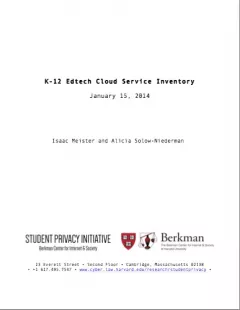
K-12 Edtech Cloud Service Inventory
A wide range of cloud technologies are now available to K-12 educators, ranging from replacements for school- and district-maintained servers (infrastructure as a service, in which servers traditionally maintained by a school or district are “outsourced” to a cloud vendor), to a variety of software tools that users access from web browsers or mobile applications, which are in turn supported and powered by third-party companies. In such a crowded landscape, it can be challenging to understand the different kinds of available services.
This inventory aims to provide a more concrete survey of the kinds of cloud computing technologies adopted in the K-12 context. It groups services according to the rough functionality
they afford, from those common to any organization (collaboration and
identity management), through the administrative office (student
information systems), to the classroom (learning management and
classroom management), and outside it (parent-teacher communication). The examples provided are meant to illustrate the kinds of cloud
technology being developed in each class and are not exhaustive. In addition, it is important to recognize that the growing ubiquity of Internet access
generally and of mobile devices specifically among students, parents,
and teachers makes it increasingly easy and desirable for cloud
application developers to create services that transcend these
boundaries. In each case, we document:
- The level of adoption: who can sign up for the service?
- The audience: who will be expected to use it?
- The pricing model: is there a fee associated with the service, and under what conditions?
- The extensibility: how, and under what circumstances, can this service be connected to or included in other services?
- Mobile integration: does the service require or suggest the use of a mobile app? is the service’s web interface designed for use with mobile browsers?
About the Student Privacy Initiative
The Berkman Center for Internet & Society's Student Privacy Initiative, led by Executive Director Urs Gasser, explores the opportunities and challenges that may arise as educational institutions consider adopting cloud computing technologies. In its work across three overlapping clusters – Privacy Expectations & Attitudes, School Practices & Policies, and Law & Policy – this initiative aims to engage diverse stakeholder groups from government, educational institutions, academia, and business, among others, develop shared good practices that promote positive educational outcomes, harness technological and pedagogical innovations, and protect critical values.
To learn more about the project, please visit http://cyber.harvard.edu/research/studentprivacy.
You might also like
- communityPrediction and Punishment